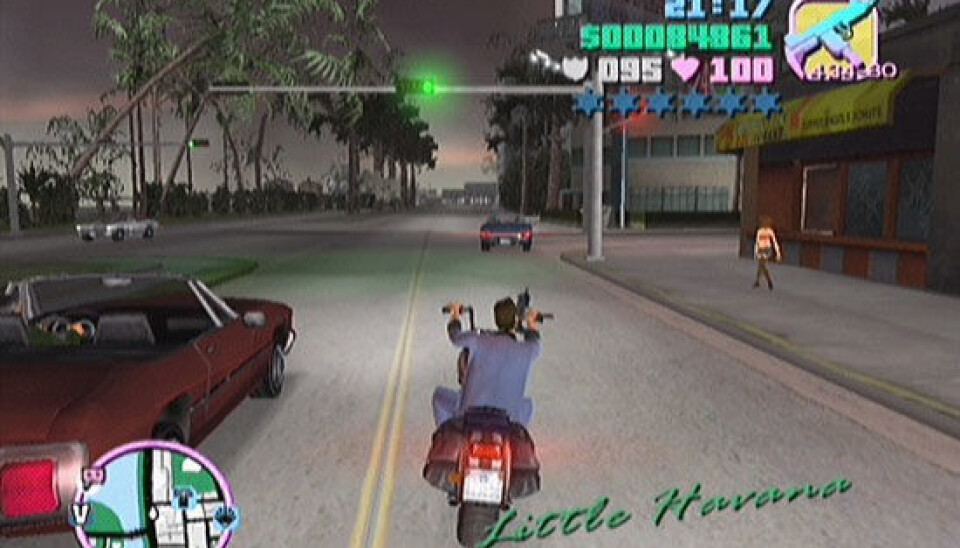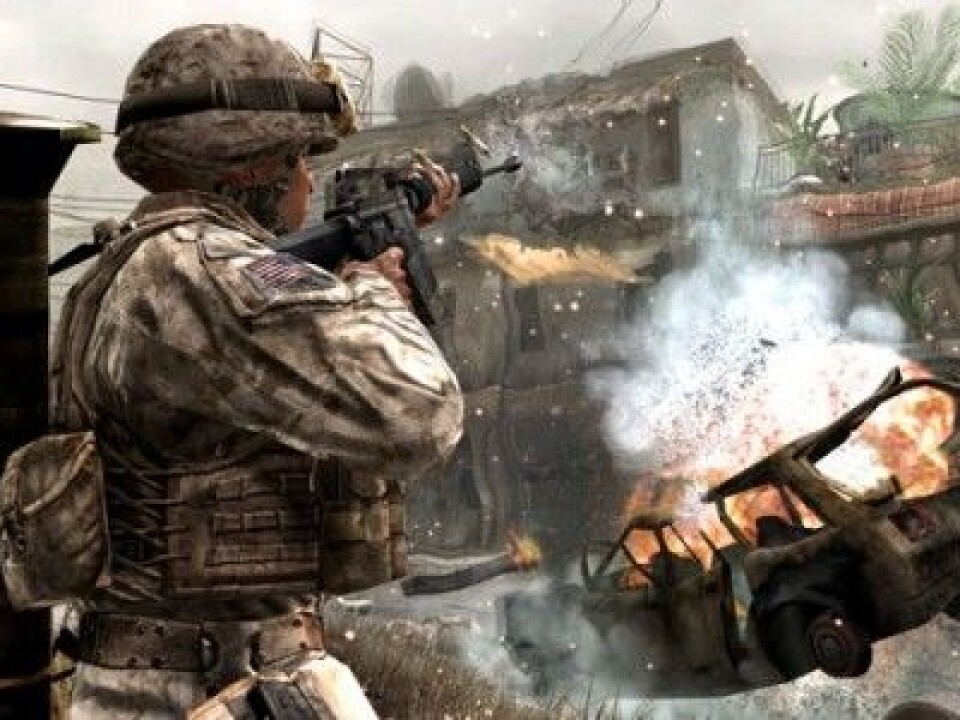
GTA is the great contemporary novel
Action games like 'Grand Theft Auto' and 'Call of Duty' reflect reality to such a degree that we fail to distinguish the metaphors used in the games from the reality they describe.
Computer games are rooted in contemporary society in the same way as movies, music, literature and politics. In this way it is possible to form an impression of contemporary society through the games: Our thoughts, dreams, influences, problems and daily lives.
Danish researcher Bo Kampmann Walther, a lecturer in media studies at the University of Southern Denmark, goes so far as to say that the great contemporary novel of our time is not a book, but a computer game.
“Computer games are – for good and bad – a mirror image of reality to such a degree that it’s probably fair to say that the great contemporary novel of our time has already been written,” he says.
“I would rank 'Grand Theft Auto' on a par with Goethe’s ‘The Sorrows of Young Werther’ and Bret Easton Ellis’s ‘American Psycho’,” says Walther, adding that the American setting is by no means unfamiliar to a young Danish audience:

“Although it takes place in a stereotyped New York, it does provide us with a clear reflection of a cultural reality that 14-year-old Danish girls are subjected to when listening to rap music, surfing the web or watching television”.
Same rhetoric as George W. Bush
Walther’s views are supported by Naja Søndergaard, who recently graduated with an MA in Linguistics from Aarhus University.
In her thesis ‘The Discourse of War’ she analyses the use of war rhetoric in computer games and concludes that the games use the same rhetoric as for instance George W. Bush used in his speeches in connection with the war on terror.
Søndergaard points out that the metaphors used in the speeches frequently appear in computer games too. She does not believe that this is because the game producers are doing pro-war propaganda, but rather that it’s because the metaphors have become such an integral part of our worldview – and also of war – that we no longer perceive them as metaphors.
The fact that we perceive metaphors as truths rather than rhetorical devices is to a large extent what makes them so powerful, precisely because they activate a worldview that we take for granted because they form part of our culture.
“One of the main characters in the game ‘Call of Duty: Modern Warfare’ is a hero who fights for democracy and freedom, even though the people whose ideals he is fighting for neither understand nor appreciate his efforts,” she says.
“This discourse can also be found in the American perception of the war on terror, and I believe that ‘Call of Duty’ uses these metaphors because they are a natural and integrated part of the worldview in the society where the game was made.”
Truths about the world in computer games
Although not an active gamer herself, Søndergaard believes that computer games today have taken on a role in society so decisive that they ought to be analysed on the same level as movies, books and speeches.
Her thesis takes a linguistic look at how the games portray war and which rhetorical devices are used in the games, based on the metaphor theories put forth by the American linguists George Lakoff and Mark Johnson.
Lakoff and Johnson describe metaphors as the basis for our perception of the world. For instance, if we say that ‘time is money’ it consolidates a Western perception of time as a valuable and limited resource that can be wisely spent or wasted.
“The metaphor theory states that metaphors are important rhetorical devices, because they are based on our understanding of the world around us and the ideals and values we are raised to follow,” says Søndergaard.
Metaphors draw upon cultural ideals and validate discourses by referring to basic cognitive patterns that are such an integral part of Western culture that people might cease to recognise them as metaphors, she adds.
“The fact that we perceive metaphors as truths rather than rhetorical devices is to a large extent what makes them so powerful, precisely because they activate a worldview that we take for granted because they form part of our culture.”
‘Call of Duty’ portrays war using the same rhetorical devices as former American President George W. Bush and other Western heads of state such as Winston Churchill and Ronald Reagan.
These metaphors are intended to portray war as a necessity and a heroic mission, and by using them the speaker may seek to gain support by appealing to familiar Western ideals such as good versus evil and right versus wrong.
Games like ‘Call of Duty’ use the same rhetoric and metaphors because this is the natural way to regard war in the society the producers live in.
Our perception of war does not spring from war itself, but rather from the story of war as it is told to us in political speeches, films, books or fleeting news updates. For this reason, the games will simply seem less realistic if they don’t adhere to the rhetoric that we’re used to associating with war.
The worldview in computer games is not disputed
Walther agrees with the conclusions of Søndergaard’s thesis. But he is also alarmed by them, since this means that the reality portrayed in the rhetoric of George W. Bush is simply continuously reproduced and never disputed.
“It is worrying because the rhetoric is not limited to the world of politics; the ways in which war is described enters seamlessly into pop culture,” says Walther.
“So long as the language used to describe war is restricted to politics, the worldview it produces is susceptible to debate and opposition. If, on the other hand, it transgresses these boundaries and enters into the world of for instance computer games, it may never be opposed.”
Walther adds that the American gaming success ‘The Sims’ is an example of this, as it resembles an elaborate advertisement for the American ideal of the nuclear family.
Personification of nations
In her thesis, Søndergaard identifies five so-called sub-discourses that are repeated both in political speeches and in ‘Call of Duty’, and which in conjunction make up the great story of warfare.
The war discourses in ‘Call of Duty’ consist of five sub-discourses:
- The discourse of friendship and freedom
- The discourse of orientalism and ‘othering’
- The discourse of the defence of democracy and civilisation
- The discourse of history writing
- The discourse of the American hero
In total, the five discourses constitute a war-discourse that forms part of a larger Empire discourse which serves to maintain the position of the US as world super power by gaining support for the war from the people.
An example of the friendship discourse can be found in the speech that George W. Bush gave shortly after 9/11, when he said “We will hunt them by day and by night in every corner of the world until they are no longer a threat to America and to our friends”.
“Metaphors like these activate cognitive processes such as sympathy, understanding and support that people feel to a much larger extent for other people than for nations. It is almost possible to visualise America and the brave friends as figures standing side by side like the ones on a movie poster for the latest Marvel-inspired Hollywood blockbuster,” says Søndergaard.
She adds that this personification demonstrates how significant these metaphors are. We don’t recognise them as metaphors, but we react to them subconsciously because they draw upon cultural values and worldviews.
“We know how important it is to have good friends and we admire those who help and protect their friends. Even the word ‘friends’ establishes who is recognised as good and who is identified as evil. The good have friends, crooks have accomplices.”
Søndergaard’s Master´s thesis is one of the first research projects to subject computer games to linguistic analysis.
-------------------------------------
Read this story in Danish at videnskab.dk
Translated by: Iben Thiele







